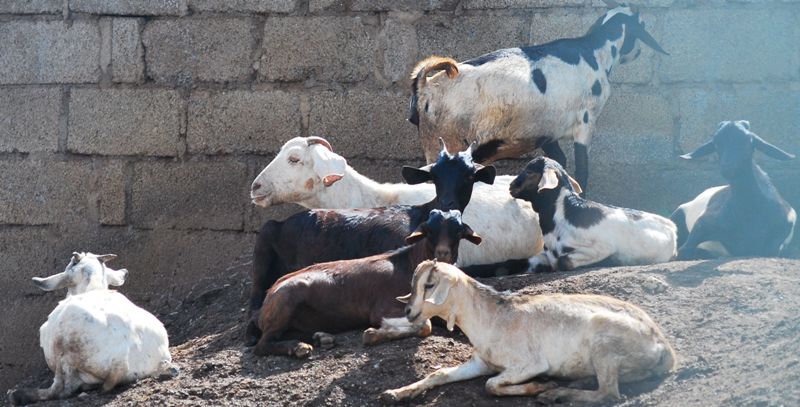By Fred Mbogo
Published January 20, 2010
One of the qualifications of being a leader in many African settings, from Kenya to Uganda, and from Congo-Kinshasa to Swaziland and South Africa, is that one aspiring to leadership, usually a man must have a “home” (read, wife and children). The unmarried and childless man is more often than not left in the cold. Community elders have a lot of say as to who is made Village Elder, Chief, Councillor, Member of Parliament and even President, FRED MBOGO argues.
It was considerably unfair of cartoonists to present Jacob Zuma, the President of South Africa’s Africa National Congress party as permanently supporting a shower on his head. This was not the image one would have liked to associate with the President of the most economically muscular country in Africa.
The story of the cold shower Comrade Zuma was said to have had soon after having had sex in questionable circumstances to allegedly wash away HIV infection, was evoked every time cartoonists presented him accompanied by a shower on his head.
When the populist Zuma sang of umshini wami (my machine gun), people always imagined more than the literal meaning of the song; this is a “struggle” song previously used by Umkhonto we Sizwe, the military wing of the ANC during the struggle against Apartheid. The colourful re-engineering of the song, especially after Zuma’s acquittal of any charges following accusations that he had been involved in the alleged rape of a family friend, left little doubt as to what kind of “machine gun” was being referred to. And yet despite this “bad” publicity, Zuma was overwhelmingly elected President of South Africa in 2009.
RELATED: Fame and Fortune Unearth Greedy and Absentee Kenyan Sperm Donor Fathers
How is it possible that a citizenry can buy into the idea of supporting a Presidential candidate who shows ignorance on questions surrounding HIV/AIDs in a country struggling to cope with the scourge? The support probably showed that the citizenry doesn’t care much about HIV/AIDs or is too tired of the unending education as regards the phenomenon. But mostly it also may point to the idea that Zuma represents the ideal kind of South African man; one who, in order to be lord, has to have lorded it over the womenfolk first. For him to be an effective leader, the imagination suggests that he must have conquered several with his “umshini” just like the brave village cockerel which only takes charge when the “hen-folk” are domineered by his prickly manners! If this is the subject of interest for the cartoonists in their drawings, then loads of history, especially African, is on their side.
Swaziland has provided the better example of leadership appreciated for its bedroom prowess. The King’s annual business of marrying a virgin that pleases his eyes beats all other businesses. Possibly, Swaziland is a very well-run African country that isn’t steeped deep in the many malaise plaguing sub-Saharan Africa and that usually makes great copy in the Western media! Joy and hope must be flowing in the country as every family in the nation might know at least one person, of the female kind, residing at the King’s palace if only for purposes of receiving once-in-a-while favours. But the king is genuinely celebrated, in colourful ceremonies and with, possibly, his own version of “umshini wami”. The citizens of Swaziland tolerate the King for a number of reasons, but one can assume it is mostly because of his “conquering” ways! Were he to have refused to marry or just remained single, he possibly would have been facing a revolution from his subjects.
RELATED: BBC to the Rescue as Radio Presentation Fails Kenyans
Historians can point to the numerous methods that Kenya’s founding President, Jomo Kenyatta, employed while dealing with his critics during his tenure. But perhaps it was his use of epithets in addressing his critics that was most colourful. In one such recorded address he tells his critics, when the grapevine suggests that he doesn’t have enough energy for the presidency, that they should ask his younger spouse “Ngina” whether he isn’t a lion in bed! This reference for the below-the-belt energy points to the idea that the loins have something to do with quality leadership which the masses like to assess. It may also suggest that Kenyatta’s popularity may have been fuelled by the thought that he was man of virility and therefore qualified to run Kenya. After all, for a man who successfully managed numerous wives and children, how could the “ruling” of a country be beyond his control?
The examples of how leaders portray themselves as capable and powerful through sexual liaisons are endless. There seems to be some silent agreement, even in these modern times where religions introduced into Africa push for limits as to how many wives one ought to have, that a man seeking power must first have proof of his capacity to procreate.
Sex is therefore a very powerful tool. When President Zuma is painted as a man who is always at his peak sexually, he wins votes regardless of the moral questions surrounding his activities. Zapiro, the cartoonist who enjoyed caricaturing Zuma in the run up to the elections in the hope of inviting doubt about the suitability of Zuma’s candidacy, , discovered to his horror that he only helped fan his popularity as people discussed Zuma as a cockerel (or is it bull?) with heroic manoeuvres. This only makes us imagine that the values of ordinary South African voters are conservative. Yet South Africa boasts a very forward looking and progressive constitution. Why hasn’t the constitution changed the values of its people?
RELATED: Eldoret Town’s Entertainment Spots Lack Authentic African Cultural Touch
It is possible therefore to argue that Zuma became President of South Africa not because of ANC’s popularity but mainly as a result of the “shower-after-sex” story. Were he, hypothetically, to decamp from the ANC and form his own political party, he could still have won the election with a landslide majority. To avoid this, the ANC held onto him, defended him, and treated him like royalty even as the “shower” story kept floating in the air. The “shower” impressions are therefore not Rather than work as a drawback for the ANC, the “shower” turned out to be a point of strength.
To the “progressive” thinker, the ANC has been led into a mucky situation by Zuma’s “immoral” activity. Its history of fighting for a moral and just society that recognises the rights of all may have been thrown to the dogs for popularity’s sake. This is because the “shower” story was more about the rights of women to decide whether they can say “yes” or “no” and be respected for their stand. As rightly argued by the Democratic Alliance leader Helen Zille, what rights have women when Zuma comes to power in his new ANC?
In contrast to Mr. Zuma’s success as a result of his prowess, President Kibaki of Kenya is shy or even modest about his influences. He is on record, as denying “in the media glare” the existence of a second wife. He is not running for the presidency again, so it may not be immediately clear whether this denial wins him votes or makes him a loser.
But Kibaki’s denial of a second wife received mixed feelings. A women’s group was given prominent media coverage after it offered support for Lucy Muthoni Kibaki, suggesting that there was only one First Lady. Mary Wambui, the alleged second wife of President Kibaki, is provided with all the trappings of a presidential spouse, including armed bodyguards and limousines.
RELATED: These Are Some Of The Annoying Things Ugandans Do
Paul Muite, a leading human rights and constitutional Kenyan lawyer, threw more interesting light to the question of President Kibaki’s wife by making statements that allude to the President’s “wives”! Many commentators in the media think that this is a matter that belongs to the bedroom and shouldn’t be discussed in public. Is this an indication that Kenyans may not have valued sexual prowess as an indicator of one’s suitability to be a leader?
In retired Kenyan President Daniel arap Moi’s tenure, there was no publicly acknowledged First Lady. But stories abounded about the state of the President’s various needs and how he went about seeking satisfaction. The only way of circulating influential “truths” was through whispers in public places such as bars and barber shops. Could there have been a propaganda machine that kept President Moi’s liaisons and bedroom prowess in no doubt through peddling such “rumours”, if only so that he could be held in awe by the electorate? But Moi also had children to speak of, so he could stand up and be counted as a man in public and therefore could rule!
Then there was “maximum respect” and awe of Nicholas Kipyator Biwott, one of Moi’s trusted cabinet ministers when he was named in Parliament as “The Bull of Auckland” for his bedroom prowess. It was reported that a senior member of the Kenyan delegation led by President Moi had attempted to rape a chamber maid at a hotel in Auckland. The incident had almost stirred a diplomatic row between Kenya and New Zealand. But many Kenyans just laughed off the incident.
RELATED: I Long For The Eight-Day Magical Christmas In My Village
Then there is Raphael Wanjala, a former MP for Budalang’i Constituency and former Assistant Minister who, after spending some time in an Indian jail with his lover Joyce Teresa Akinyi Ochieng “estranged wife of one Antony Wale Chinedu” for failing to declare that they were carrying more than US$5000 currency to customs officers, returned home to a hero’s welcome in 2009. He even extolled the virtues of polygyny in the media glare.
The question of whether sex and power go together can only best be captured in the stories coming from the now infamous torture chambers in Nyayo and Nyati houses where perceived enemies of the Moi regime were held. One of the most gripping methods of torture was of the torturing personnel to sexually molest the victims. Sexual organs were said to be literally “crushed” and in many cases were left for dead so that when the victims were set free their wives would feel robbed. The agony suffered by the victims would often times silence them forever. The torturers perhaps knew that by incapacitating the victims’ sexual organs they would effectively deal with their ambitions for power!





